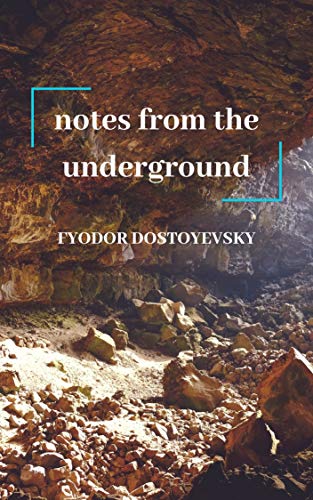-
Notes from Underground
Fyodor Dostoyevsky, Constance Garnett
eBook (e-artnow, Oct. 25, 2013)This carefully crafted ebook: “Notes from Underground (The Unabridged Garnett Translation)” is formatted for your eReader with a functional and detailed table of contents. This is the version based on the unabridged Garnett Translation. Notes from Underground is an 1864 novella by Fyodor Dostoyevsky. Notes is considered by many to be the first existentialist novel. It presents itself as an excerpt from the rambling memoirs of a bitter, isolated, unnamed narrator (generally referred to by critics as the Underground Man) who is a retired civil servant living in St. Petersburg. The first part of the story is told in monologue form, or the underground man's diary, and attacks emerging Western philosophy, especially Nikolay Chernyshevsky's What Is to Be Done? The second part of the book is called "Àpropos of the Wet Snow", and describes certain events that, it seems, are destroying and sometimes renewing the underground man, who acts as a first person, unreliable narrator. Fyodor Mikhailovich Dostoyevsky ( 1821 – 1881) was a Russian novelist, short story writer, essayist and philosopher. Dostoyevsky's literary works explore human psychology in the context of the troubled political, social, and spiritual atmosphere of 19th-century Russia. Many literary critics rate him as one of the greatest and most prominent psychologists in world literature.
-
Notes from the Underground
Fyodor Dostoyevsky
Hardcover (SMK Books, April 3, 2018)Considered by many to be the first existentialist novel, Notes from the Underground presents itself as an excerpt from the rambling memoirs of a bitter, isolated, unnamed narrator who is a retired civil servant living in St. Petersburg.
-
Notes from Underground
Fyodor Dostoevsky
Paperback (BN Publishing, March 23, 2009)The passionate confessions of a suffering soul; the brutal self-loathing of a tormented man; the scathing scorn of an alienated antihero who has become one of the greatest figures in all literature. Notes from Underground, published in 1864, introduces the moral, political, and social ideas Dostoevsky later explores in such masterpieces as Crime and Punishment, The Idiot, and The Brothers Karamazov .
-
Notes from the Underground
Fyodor Dostoyevsky, Fyodor Mikhailovich Dostoevsky
Paperback (Watchmaker Publishing, June 20, 2010)An Unabridged Edition with both Parts I and II Including A "Note from the Author"-
-
Notes from the Underground
Fyodor Dostoyevsky, Pete Simonelli
MP3 CD (Brilliance Audio, Feb. 22, 2018)Isolated from society in a tenement basement in St. Petersburg, a malicious former civil servant vents his resentments. In the rambling notes that follow, we are exposed to the inner turmoil of the Underground Man, who represents the voice of his generation. An emotional, paranoid knot of contradictions, the spiteful narrator is also desperate to join a society he loathes, if only to prove his superiority to it.Exploring themes of free will versus determinism, Dostoyevsky’s existential exploration was written to challenge increasingly popular Western egoist philosophies. In the Underground Man, he found the embodiment of the antihero, whose behavior—like all human behavior—defies rationalization.AmazonClassics brings you timeless works from the masters of storytelling. Ideal for anyone who wants to read a great work for the first time or rediscover an old favorite, these new editions open the door to literature’s most unforgettable characters and beloved worlds.Revised edition: Previously published as Notes from the Underground, this edition of Notes from the Underground (AmazonClassics Edition) includes editorial revisions.
-
Notes from Underground
Fyodor Dostoyevsky
Hardcover (Amereon Ltd, June 1, 1976)This title comes from the award-winning translators of "Crime and Punishment", Richard Pevear and Larissa Volokhonsky. The apology and confession of a minor mid-19th-century Russian official, "Notes from Underground" is a half-desperate, half-mocking political critique and a powerful, at times absurdly comical, account of man's breakaway from society and descent 'underground'.
-
Notes from Underground
Fyodor Dostoyevsky
Mass Market Paperback (Signet Classics, Oct. 1, 1961)In this Signet Classic volume can be seen Dostoyevsky's evolving outlook on man's fate. The works presented here were written at distinct periods in the author's life, at decisive moments in his groping for a political philosophy and a religious answer.
-
Notes from Underground
Fyodor Dostoyevsky
eBook (Otbebookpublishing, Dec. 27, 2015)"Notes from the Underground" is considered by many to be the first existentialist novel. It presents itself as an excerpt from the rambling memoirs of a bitter, isolated, unnamed narrator (generally referred to by critics as the Underground Man) who is a retired civil servant living in St. Petersburg.
-
Notes From Underground
Fyodor Dostoevsky, Constance Garnett
Paperback (CreateSpace Independent Publishing Platform, Jan. 1, 1864)Notes from Underground, also translated as Notes from the Underground or Letters from the Underworld, is an 1864 novella by Fyodor Dostoevsky. Notes is considered by many to be one of the first existentialist novels. It presents itself as an excerpt from the rambling memoirs of a bitter, isolated, unnamed narrator (generally referred to by critics as the Underground Man) who is a retired civil servant living in St. Petersburg. The first part of the story is told in monologue form, or the underground man's diary, and attacks emerging Western philosophy, especially Nikolay Chernyshevsky's What Is to Be Done?. The second part of the book is called "Apropos of the Wet Snow", and describes certain events that, it seems, are destroying and sometimes renewing the underground man, who acts as a first person, unreliable narrator and anti-hero.
-
Notes from Underground
Fyodor Dostoevsky
eBook (, March 31, 2020)Notes from Underground , also translated as Notes from the Underground or Letters from the Underworld, is an 1864 novella by Fyodor Dostoevsky. Notes is considered by many to be one of the first existentialist novels.It presents itself as an excerpt from the rambling memoirs of a bitter, isolated, unnamed narrator (generally referred to by critics as the Underground Man), who is a retired civil servant living in St. Petersburg. The first part of the story is told in monologue form, or the underground man's diary, and attacks emerging Western philosophy, especially Nikolay Chernyshevsky's What Is to Be Done? The second part of the book is called "Apropos of the Wet Snow" and describes certain events that appear to be destroying and sometimes renewing the underground man, who acts as a first person, unreliable narrator and anti-hero.
-
Notes From the Underground
Fyodor Dostoyevsky
eBook (Digireads.com, April 3, 2004)A predecessor to such monumental works as "Crime and Punishment" and "The Brothers Karamazov", "Notes From Underground" represents a turning point in Dostoyevsky's writing towards the more political side. In this work we follow the unnamed narrator of the story, who disillusioned by the oppression and corruption of the society in which he lives withdraws from that society into the underground. A dark and politically charged novel, "Notes From Underground" shows Dostoyevsky at his best.
-
Notes from Underground
Fyodor Dostoevsky
eBook (Dover Publications, April 11, 2020)Notes from Underground (pre-reform Russian: Записки изъ подполья; post-reform Russian: Записки из подполья, tr. Zapíski iz podpólʹya), also translated as Notes from the Underground or Letters from the Underworld, is an 1864 novella by Fyodor Dostoevsky. Notes is considered by many to be one of the first existentialist novels.[1] It presents itself as an excerpt from the rambling memoirs of a bitter, isolated, unnamed narrator (generally referred to by critics as the Underground Man), who is a retired civil servant living in St. Petersburg. The first part of the story is told in monologue form, or the underground man's diary, and attacks emerging Western philosophy, especially Nikolay Chernyshevsky's What Is to Be Done?[2] The second part of the book is called "Apropos of the Wet Snow" and describes certain events that appear to be destroying and sometimes renewing the underground man, who acts as a first person, unreliable narrator and anti-hero.[3]